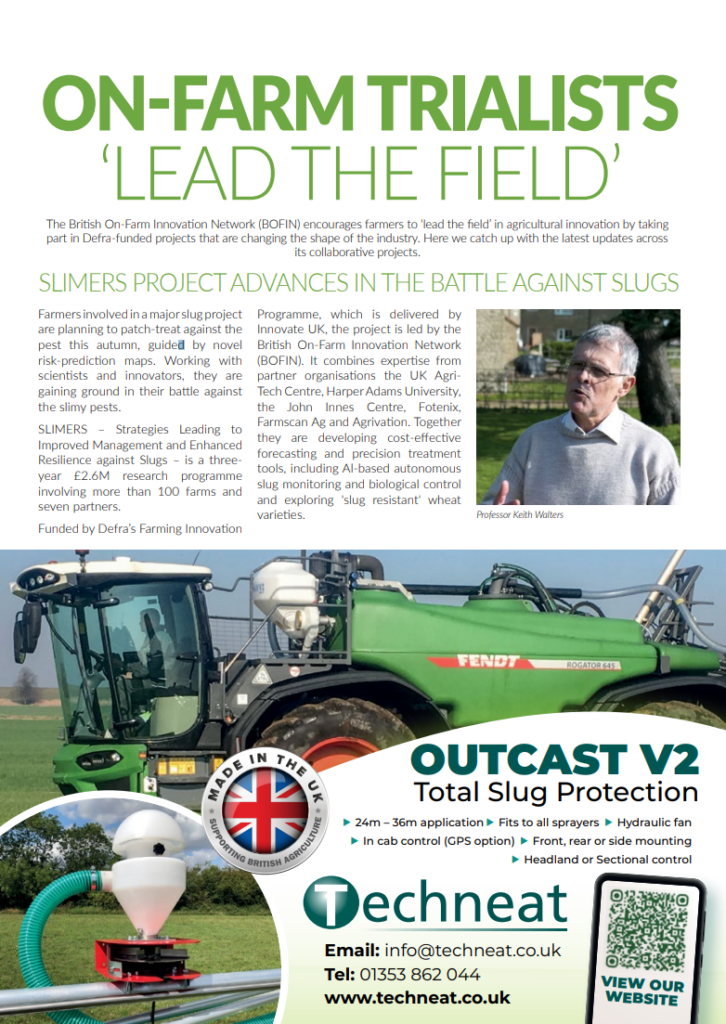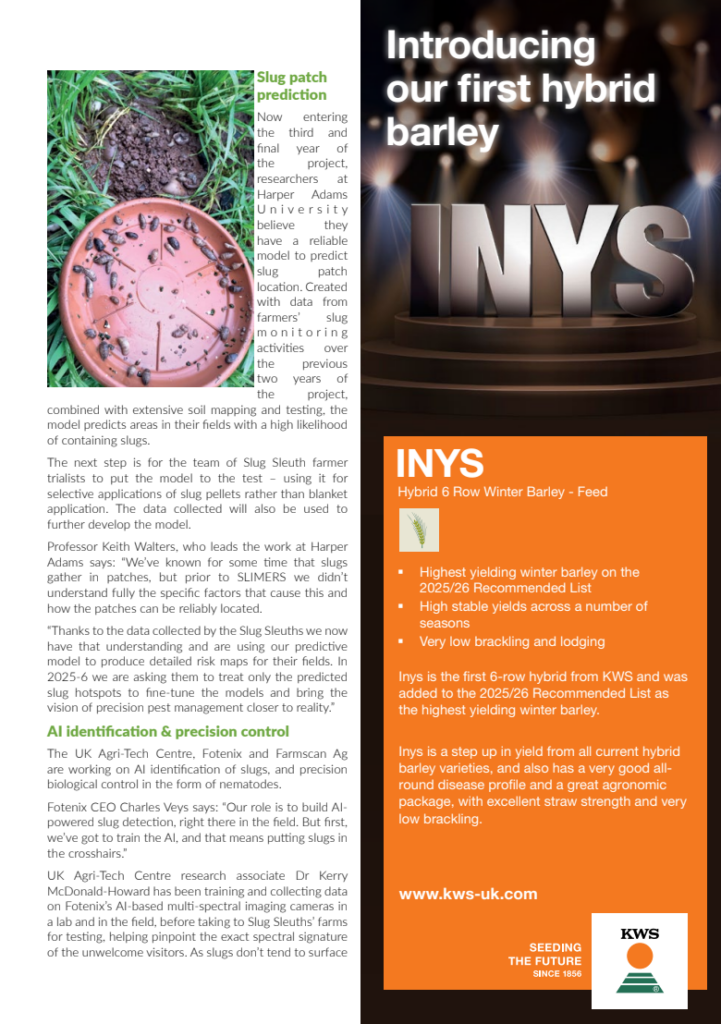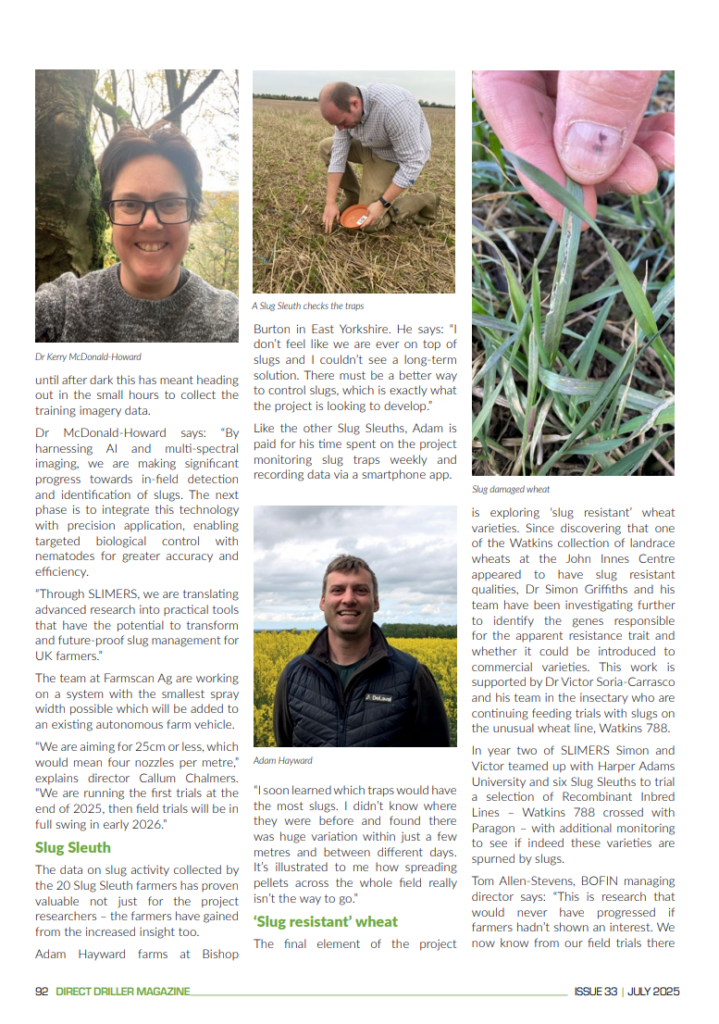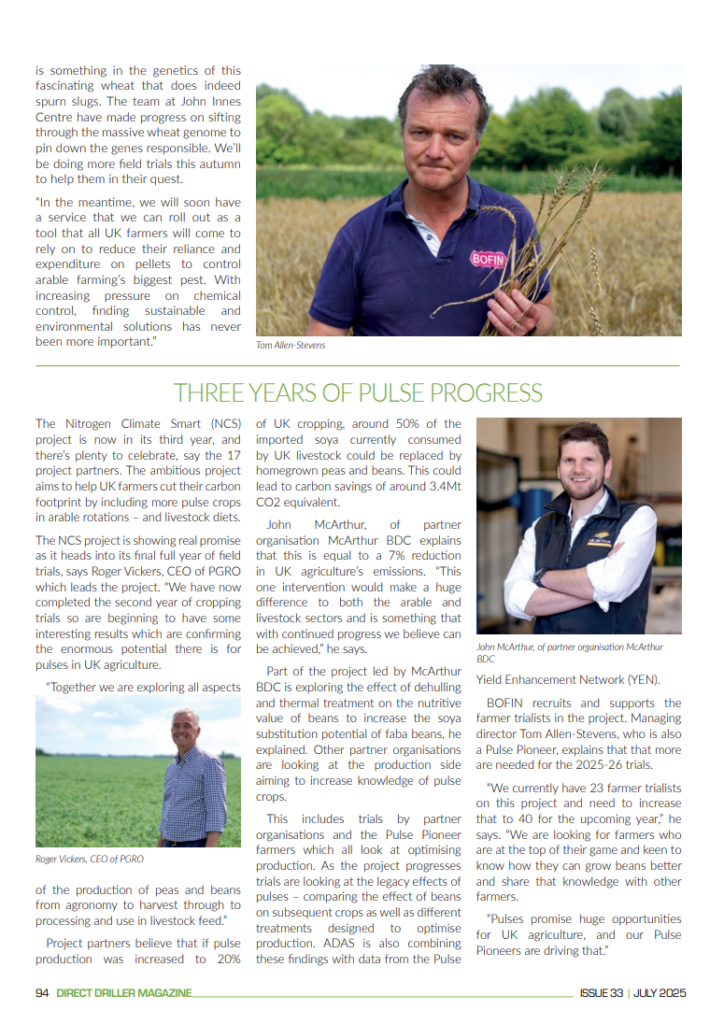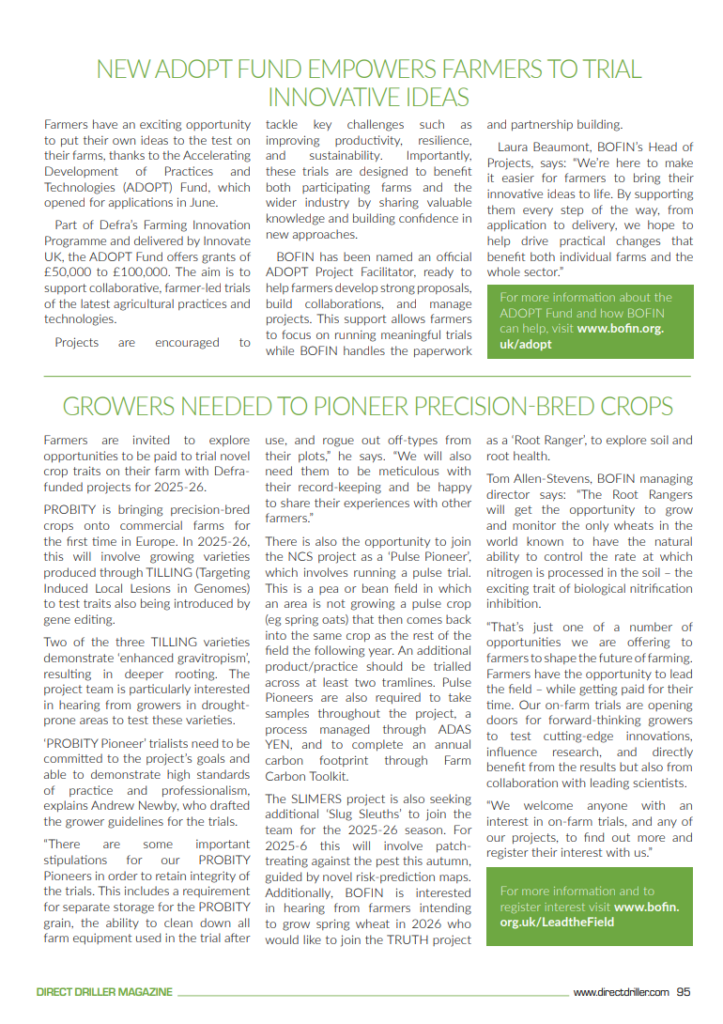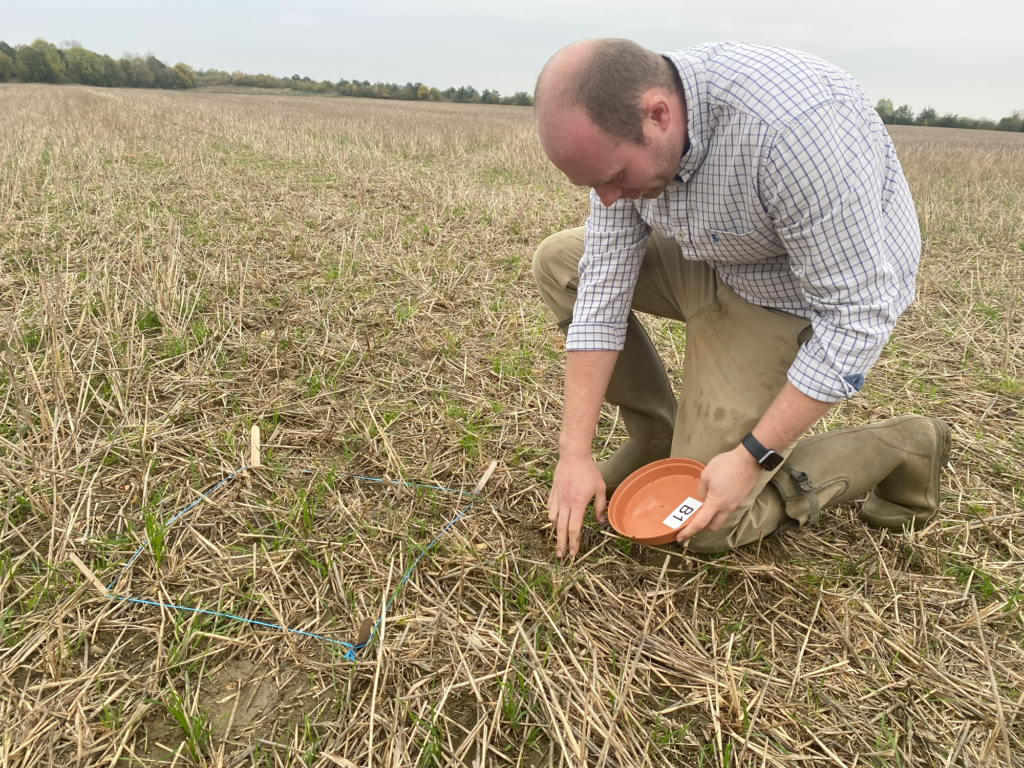The British On-Farm Innovation Network (BOFIN) encourages farmers to ‘lead the field’ in agricultural innovation by taking part in Defra-funded projects that are changing the shape of the industry. Here we catch up with the latest updates across its collaborative projects.
SLIMERS project advances in the battle against slugs
Farmers involved in a major slug project are planning to patch-treat against the pest this autumn, guided by novel risk-prediction maps. Working with scientists and innovators, they are gaining ground in their battle against the slimy pests.
SLIMERS – Strategies Leading to Improved Management and Enhanced Resilience against Slugs – is a three-year £2.6M research programme involving more than 100 farms and seven partners.
Funded by Defra’s Farming Innovation Programme, which is delivered by Innovate UK, the project is led by the British On-Farm Innovation Network (BOFIN). It combines expertise from partner organisations the UK Agri-Tech Centre, Harper Adams University, the John Innes Centre, Fotenix, Farmscan Ag and Agrivation. Together they are developing cost-effective forecasting and precision treatment tools, including Al-based autonomous slug monitoring and biological control and exploring ‘slug resistant’ wheat varieties.
Slug patch prediction
Now entering the third and final year of the project, researchers at Harper Adams University believe they have a reliable model to predict slug patch location. Created with data from farmers’ slug monitoring activities over the previous two years of the project, combined with extensive soil mapping and testing, the model predicts areas in their fields with a high likelihood of containing slugs.
The next step is for the team of Slug Sleuth farmer trialists to put the model to the test – using it for selective applications of slug pellets rather than blanket application. The data collected will also be used to further develop the model.
Professor Keith Walters, who leads the work at Harper Adams says: “We’ve known for some time that slugs gather in patches, but prior to SLIMERS we didn’t understand fully the specific factors that cause this and how the patches can be reliably located.
“Thanks to the data collected by the Slug Sleuths we now have that understanding and are using our predictive model to produce detailed risk maps for their fields. In 2025-6 we are asking them to treat only the predicted slug hotspots to fine-tune the models and bring the vision of precision pest management closer to reality.”
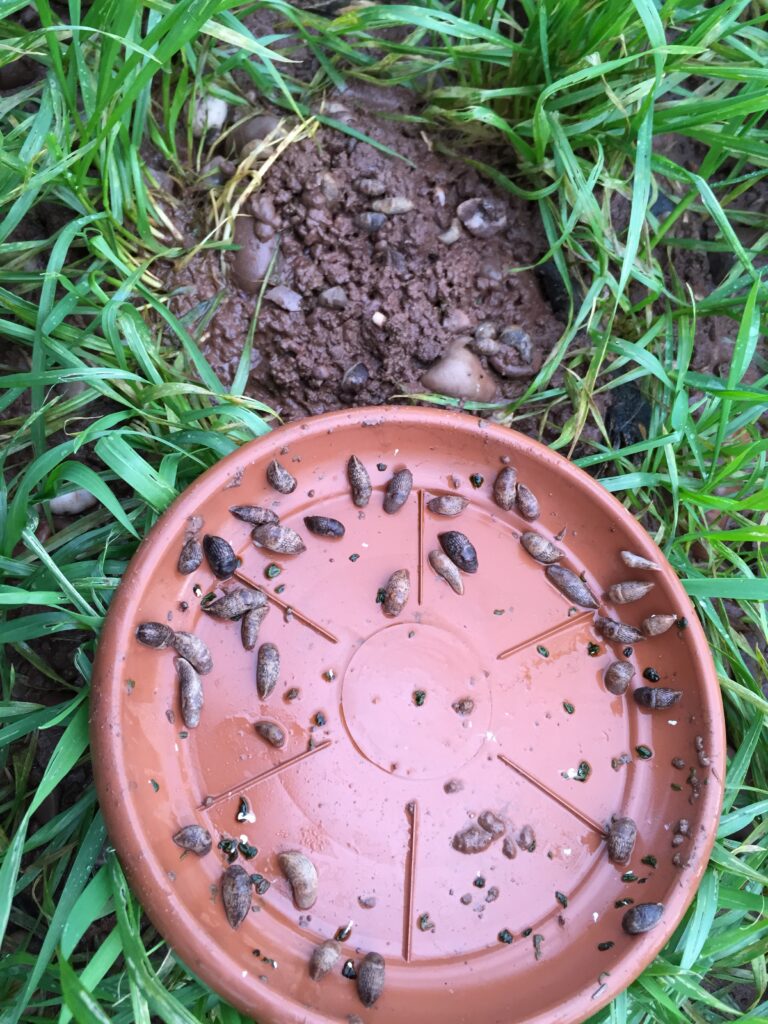
AI identification & precision control
The UK Agri-Tech Centre, Fotenix and Farmscan Ag are working on AI identification of slugs, and precision biological control in the form of nematodes.
Fotenix CEO Charles Veys says: “Our role is to build AI-powered slug detection, right there in the field. But first, we’ve got to train the AI, and that means putting slugs in the crosshairs.”
UK Agri-Tech Centre research associate Dr Kerry McDonald-Howard has been training and collecting data on Fotenix’s AI-based multi-spectral imaging cameras in a lab and in the field, before taking to Slug Sleuths’ farms for testing, helping pinpoint the exact spectral signature of the unwelcome visitors. As slugs don’t tend to surface until after dark this has meant heading out in the small hours to collect the training imagery data.
Dr McDonald-Howard says: “By harnessing AI and multi-spectral imaging, we are making significant progress towards in-field detection and identification of slugs. The next phase is to integrate this technology with precision application, enabling targeted biological control with nematodes for greater accuracy and efficiency.

“Through SLIMERS, we are translating advanced research into practical tools that have the potential to transform and future-proof slug management for UK farmers.”
The team at Farmscan Ag are working on a system with the smallest spray width possible which will be added to an existing autonomous farm vehicle.
“We are aiming for 25cm or less, which would mean four nozzles per metre,” explains director Callum Chalmers. “We are running the first trials at the end of 2025, then field trials will be in full swing in early 2026.”
Slug Sleuth
The data on slug activity collected by the 20 Slug Sleuth farmers has proven valuable not just for the project researchers – the farmers have gained from the increased insight too.
Adam Hayward farms at Bishop Burton in East Yorkshire. He says: “I don’t feel like we are ever on top of slugs and I couldn’t see a long-term solution. There must be a better way to control slugs, which is exactly what the project is looking to develop.”
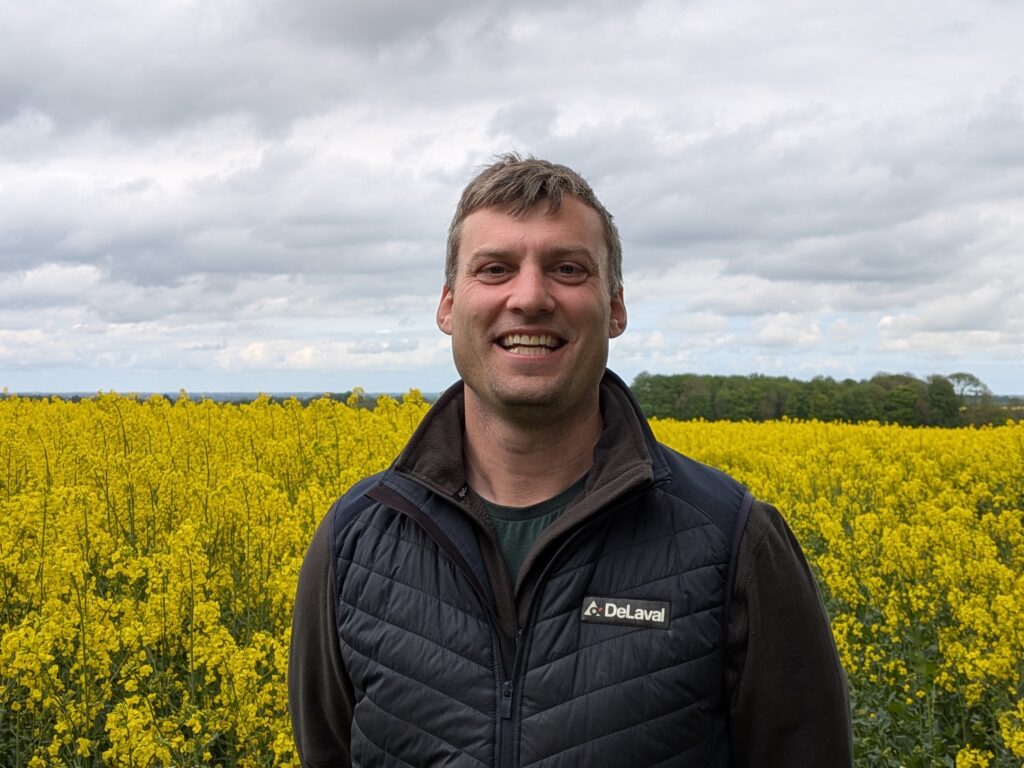
Like the other Slug Sleuths, Adam is paid for his time spent on the project monitoring slug traps weekly and recording data via a smartphone app.
“I soon learned which traps would have the most slugs. I didn’t know where they were before and found there was huge variation within just a few metres and between different days. It’s illustrated to me how spreading pellets across the whole field really isn’t the way to go.”
‘Slug resistant’ wheat
The final element of the project is exploring ‘slug resistant’ wheat varieties. Since discovering that one of the Watkins collection of landrace wheats at the John Innes Centre appeared to have slug resistant qualities, Dr Simon Griffiths and his team have been investigating further to identify the genes responsible for the apparent resistance trait and whether it could be introduced to commercial varieties. This work is supported by Dr Victor Soria-Carrasco and his team in the insectary who are continuing feeding trials with slugs on the unusual wheat line, Watkins 788.
In year two of SLIMERS Simon and Victor teamed up with Harper Adams University and six Slug Sleuths to trial a selection of Recombinant Inbred Lines – Watkins 788 crossed with Paragon – with additional monitoring to see if indeed these varieties are spurned by slugs.
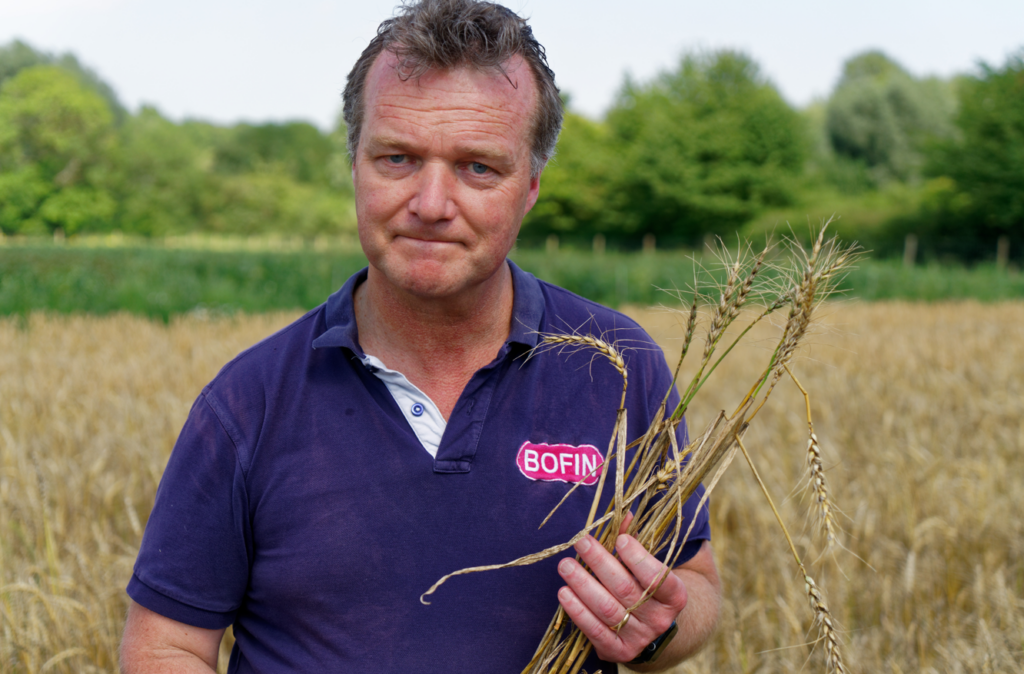
Tom Allen-Stevens, BOFIN managing director says: “This is research that would never have progressed if farmers hadn’t shown an interest. We now know from our field trials there is something in the genetics of this fascinating wheat that does indeed spurn slugs. The team at John Innes Centre have made progress on sifting through the massive wheat genome to pin down the genes responsible. We’ll be doing more field trials this autumn to help them in their quest.
“In the meantime, we will soon have a service that we can roll out as a tool that all UK farmers will come to rely on to reduce their reliance and expenditure on pellets to control arable farming’s biggest pest. With increasing pressure on chemical control, finding sustainable and environmental solutions has never been more important.”
Three years of pulse progress
The Nitrogen Climate Smart (NCS) project is now in its third year, and there’s plenty to celebrate, say the 17 project partners. The ambitious project aims to help UK farmers cut their carbon footprint by including more pulse crops in arable rotations – and livestock diets.
The NCS project is showing real promise as it heads into its final full year of field trials, says Roger Vickers, CEO of PGRO which leads the project. “We have now completed the second year of cropping trials so are beginning to have some interesting results which are confirming the enormous potential there is for pulses in UK agriculture.
“Together we are exploring all aspects of the production of peas and beans from agronomy to harvest through to processing and use in livestock feed.”
Project partners believe that if pulse production was increased to 20% of UK cropping, around 50% of the imported soya currently consumed by UK livestock could be replaced by homegrown peas and beans. This could lead to carbon savings of around 3.4Mt CO2 equivalent.
John McArthur, of partner organisation McArthur BDC explains that this is equal to a 7% reduction in UK agriculture’s emissions. “This one intervention would make a huge difference to both the arable and livestock sectors and is something that with continued progress we believe can be achieved,” he says.
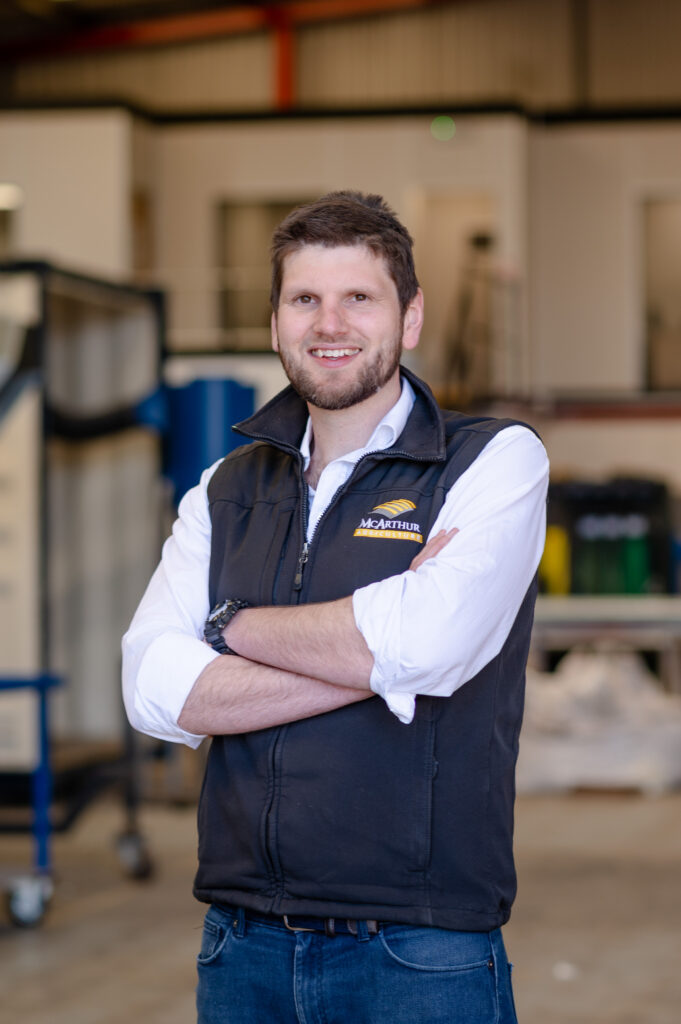
Part of the project led by McArthur BDC is exploring the effect of dehulling and thermal treatment on the nutritive value of beans to increase the soya substitution potential of faba beans, he explained. Other partner organisations are looking at the production side aiming to increase knowledge of pulse crops.
This includes trials by partner organisations and the Pulse Pioneer farmers which all look at optimising production. As the project progresses trials are looking at the legacy effects of pulses – comparing the effect of beans on subsequent crops as well as different treatments designed to optimise production. ADAS is also combining these findings with data from the Pulse Yield Enhancement Network (YEN).
BOFIN recruits and supports the farmer trialists in the project. Managing director Tom Allen-Stevens, who is also a Pulse Pioneer, explains that that more are needed for the 2025-26 trials.
“We currently have 23 farmer trialists on this project and need to increase that to 40 for the upcoming year,” he says. “We are looking for farmers who are at the top of their game and keen to know how they can grow beans better and share that knowledge with other farmers.
“Pulses promise huge opportunities for UK agriculture, and our Pulse Pioneers are driving that.”
New ADOPT fund empowers farmers to trial innovative ideas
Farmers have an exciting opportunity to put their own ideas to the test on their farms, thanks to the Accelerating Development of Practices and Technologies (ADOPT) Fund, which opened for applications in June.
Part of Defra’s Farming Innovation Programme and delivered by Innovate UK, the ADOPT Fund offers grants of £50,000 to £100,000. The aim is to support collaborative, farmer-led trials of the latest agricultural practices and technologies.
Projects are encouraged to tackle key challenges such as improving productivity, resilience, and sustainability. Importantly, these trials are designed to benefit both participating farms and the wider industry by sharing valuable knowledge and building confidence in new approaches.
BOFIN has been named an official ADOPT Project Facilitator, ready to help farmers develop strong proposals, build collaborations, and manage projects. This support allows farmers to focus on running meaningful trials while BOFIN handles the paperwork and partnership building.
Laura Beaumont, BOFIN’s Head of Projects, says: “We’re here to make it easier for farmers to bring their innovative ideas to life. By supporting them every step of the way, from application to delivery, we hope to help drive practical changes that benefit both individual farms and the whole sector.”
For more information about the ADOPT Fund and how BOFIN can help, visit www.bofin.org.uk/adopt
Growers needed to pioneer precision-bred crops
Farmers are invited to explore opportunities to be paid to trial novel crop traits on their farm with Defra-funded projects for 2025-26.
PROBITY is bringing precision-bred crops onto commercial farms for the first time in Europe. In 2025-26, this will involve growing varieties produced through TILLING (Targeting Induced Local Lesions in Genomes) to test traits also being introduced by gene editing.
Two of the three TILLING varieties demonstrate ‘enhanced gravitropism’, resulting in deeper rooting. The project team is particularly interested in hearing from growers in drought-prone areas to test these varieties.
‘PROBITY Pioneer’ trialists need to be committed to the project’s goals and able to demonstrate high standards of practice and professionalism, explains Andrew Newby, who drafted the grower guidelines for the trials.
“There are some important stipulations for our PROBITY Pioneers in order to retain integrity of the trials. This includes a requirement for separate storage for the PROBITY grain, the ability to clean down all farm equipment used in the trial after use, and rogue out off-types from their plots,” he says. “We will also need them to be meticulous with their record-keeping and be happy to share their experiences with other farmers.”
There is also the opportunity to join the NCS project as a ‘Pulse Pioneer’, which involves running a pulse trial. This is a pea or bean field in which an area is not growing a pulse crop (eg spring oats) that then comes back into the same crop as the rest of the field the following year. An additional product/practice should be trialled across at least two tramlines. Pulse Pioneers are also required to take samples throughout the project, a process managed through ADAS YEN, and to complete an annual carbon footprint through Farm Carbon Toolkit.
The SLIMERS project is also seeking additional ‘Slug Sleuths’ to join the team for the 2025-26 season. For 2025-6 this will involve patch-treating against the pest this autumn, guided by novel risk-prediction maps. Additionally, BOFIN is interested in hearing from farmers intending to grow spring wheat in 2026 who would like to join the TRUTH project as a ‘Root Ranger’, to explore soil and root health.
Tom Allen-Stevens, BOFIN managing director says: “The Root Rangers will get the opportunity to grow and monitor the only wheats in the world known to have the natural ability to control the rate at which nitrogen is processed in the soil – the exciting trait of biological nitrification inhibition.
“That’s just one of a number of opportunities we are offering to farmers to shape the future of farming. Farmers have the opportunity to lead the field – while getting paid for their time. Our on-farm trials are opening doors for forward-thinking growers to test cutting-edge innovations, influence research, and directly benefit from the results but also from collaboration with leading scientists.
“We welcome anyone with an interest in on-farm trials, and any of our projects, to find out more and register their interest with us.”
For more information and to register interest visit www.bofin.org.uk/LeadtheField
